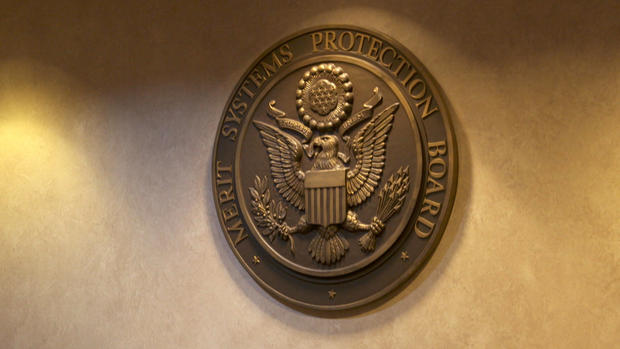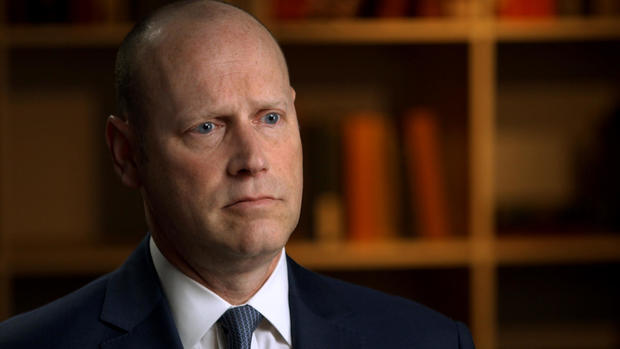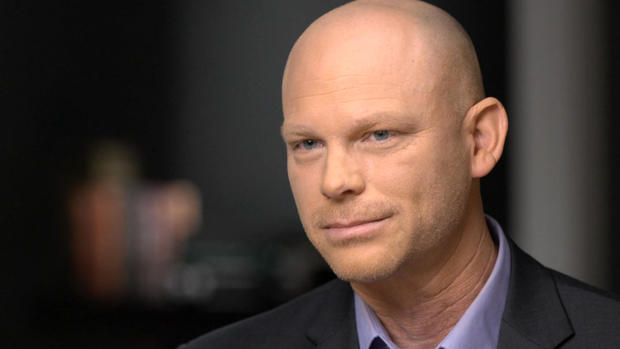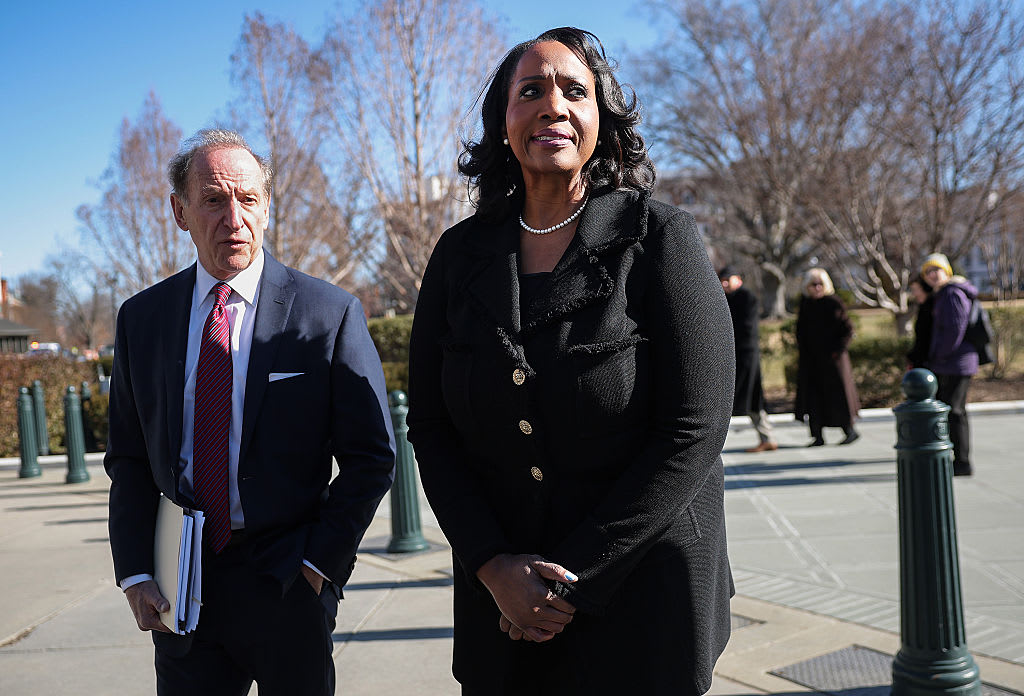Appeals board protecting federal workers unable to function because of vacant positions
This is a story about a small federal agency most Americans have never heard of called the Merit Systems Protection Board. It's meant to give 2 million federal civil service workers, including whistleblowers, a place to appeal should they be disciplined, demoted or fired. It's not that the board is working poorly, but that the board is not working at all. Since 2017, it has lacked enough members to pass judgement on any appeals, and for well over a year, the board has had no one on it, leaving three empty chairs and a backlog of cases that's now in the thousands.
Half a mile north of the White House, stands the unmarked headquarters of the Merit Systems Protection Board, or MSPB.
We got permission to visit in early February, before COVID-19 made working from home the norm. About 100 staffers were there, analyzing petitions from both federal workers and agencies about employment disputes.
Cases that would usually make their way to the board for a final ruling were instead going into storage, because the chairman's spacious office suite, as well as the vice-chairman's, and another for the third and final member of the board, were all empty, and not because of the pandemic.
President Trump has nominated people to fill all three open positions, but the nominations have languished in the senate, awaiting confirmation.
Jim Eisenmann: Without a board, without at least two board members, we're lost.
From 2010 to 2018, Jim Eisenmann worked for the chairman of the board, as general counsel and executive director.
Norah O'Donnell: The Merit Systems Protection Board. Why should Americans know or care what that is?
Jim Eisenmann: This agency is there to help and protect federal employees from both bad supervisors and poor performers. And all you need is one bad employee, one bad supervisor for things to go amuck in any federal agency. And if you're getting your benefits, your services, whatever they are, safe drugs and medicine, you're gonna want this agency to be there to protect and-- enforce the Federal Merit Systems.
Norah O'Donnell: What are these Merit Systems' principles?
Jim Eisenmann: That people will be hired based on merit, that they will not be discriminated against, that decisions will be based on their performance rather than someone's personal feeling about them.
Norah O'Donnell: And has the board ever had so many vacancies for so long?
Jim Eisenmann: Never.
In a divided capital, the board stands apart in that by law, it is bipartisan. Only two of three members can be from the same political party. It was established 42 years ago, but its roots go back to the 19th century and Republican Teddy Roosevelt, who before becoming president, championed the creation of the U.S. Civil Service Commission, the precursor to today's board.
Debra Roth: The American public, you know, made a decision 140 years ago that they want their government run by qualified people. And they want it run efficiently.
For 30 years, attorney Debra Roth has represented both federal agencies and employees in front of the board. She's worried about what the breakdown at MSPB means for the average citizen.
Debra Roth: MSPB is the one making sure that everyone's playing by the rules on the inside.
Norah O'Donnell: So in effect, with no board, is there more waste, fraud, and abuse that's going on in government?
Debra Roth: Probably. It is the internal accountability for the rest of government. It's not like every case ends up at MSPB. So for statistics, you consider something like over two million people are part of the federal workforce in the Executive Branch. About every year, about 80,000 of them quit. Another 12,000 are getting fired for cause. And those people are probably the ones who are gonna end up, possibly, a portion of them, filing an appeal at MSPB.
Before a case gets to the board, it goes to an MSPB administrative judge who issues an initial decision. Only about 800 decisions a year then get appealed to the board. These days, with no one to rule on them, the cardboard boxes holding some of the nearly 2,900 cases in the backlog are stacked in multiple offices throughout the agency.
Jim Eisenmann: And each of those cases is an individual waiting for justice, and an agency waiting for certainty as to what's going to happen with that employee. Is that employee going back to work or are they not?
Traditionally the board gets involved in other cases at the request of the Office of Special Counsel, a federal watchdog that's supposed to protect whistleblowers, like Rick Bright.
Bright was the first federal official to publicly proclaim that the Trump administration's response to the pandemic was disorganized and so slow that it cost lives.
Rick Bright at Congressional hearing: If we fail to improve our response now based on science, I fear the pandemic will get worse and be prolonged.
Before he testified before Congress, Bright filed a complaint with the special counsel alleging his bosses at Health and Human Services demoted him for sounding the alarm. The special counsel's office "found a substantial likelihood of wrongdoing" and asked HHS Secretary Alex Azar to give him his old job back while it investigated.
In April, Bright sat down with 60 Minutes.
Norah O'Donnell: Our understanding is that the Merit Systems Protection Board could reinstate you at your job pending an investigation into your complaint. Had you ever heard of the MSPB before your complaint?
Rick Bright: No. Honestly, I hadn't. I-- I've learned though since my complaint that-- that MSPB, that Merit Systems Protection Board is full of empty chairs.
Rick Bright's case may be the most high-profile impacted by the three empty chairs but it's not the only one to involve a whistleblower. After filing a Freedom of Information Act request, we learned about a quarter of the cases in the backlog include whistleblower claims. The backlog stretches across 55 federal agencies but the most whistleblower cases from one agency, 197, are from the Department of Veterans Affairs, or VA. One of them belongs to Chris Marcus.
Chris Marcus: I put my heart and soul into the VA because I knew we could fix it.
After graduating from the Air Force Academy in 1992, Marcus served for 20 years. In 2008 he helped run the U.S. military's busiest combat trauma hospital during the surge in the Iraq War. After retiring as a lieutenant colonel, Marcus was hired by the VA and eventually put in charge of three outpatient clinics serving approximately 80,000 veterans in Tennessee. He says members of his staff violated basic health and safety guidelines and mishandled patients' medical files, but the worst problem he described was doctors who showed up late and sometimes disappeared, leaving elderly veterans waiting for hours.
Chris Marcus: If you can't get your staff to show up for work on time, then that's a problem. That's one of the accusations I had against me was that I would walk around the halls looking for people coming into work late. Like, I'm guilty. (LAUGH) Yes, I did.
Norah O'Donnell: What did you do?
Chris Marcus: A coworker and I, we would constantly elevating that to the-- to the appropriate leadership, saying, "We have got to do something about these providers." And-- and nothing ever happened.
Norah O'Donnell: When the VA fired you, what was their justification?
Chris Marcus: That I created a hostile work environment. That was pretty much it.
Norah O'Donnell: The unprofessional behavior that you were accused of by the VA, is there any truth to it?
Chris Marcus: No, (SIGH) and-- they gave me a stack of paperwork about this thick that was the evidence file used against me. And I'm just thinking, "Oh my goodness. What did I do?" I mean, I really-- racking my brain, "What on earth did I do?"
An administrative judge ruled this past December that the only thing Chris Marcus did was his job. The judge wrote in his decision, the VA's allegation Marcus had been unprofessional "lacked any factual basis," and that a VA executive, "had [a] motive to retaliate against" him. More importantly, the judge added Marcus was "an employee that the VA should be seeking to retain and promote instead of removing."
Chris Marcus: He's absolutely right. I-- I-- I challenge anyone to find anything in that evidence package that's actually evidence of any conduct unbecoming or unprofessionalism. It's just not there.
The judge ordered the VA to reinstate Lt Col. Marcus and give him back pay and interest which at the time was upwards of $50,000. The VA refused and appealed to the board, but because no one was on it, the case and Marcus' life entered a state of limbo.
Chris Marcus: Even if you win, you lose.
Norah O'Donnell: Do you consider yourself a whistleblower?
Chris Marcus: I'd never thought of me as being a whistleblower. I guess I am because I've been identifying these things for years and my leadership retaliated against me for that.
In early April, five months after Chris Marcus' case joined the backlog, we asked the VA about him. The VA declined to comment specifically, but two weeks later, offered him a settlement that included nearly a year's worth of backpay, plus interest, damages, legal fees, and a new job that allows him to work from home that he started last month.
Attorney Debra Roth does not represent Chris Marcus but says justice for others caught in the backlog will be harder to come by. An appeals process that used to take months will now take years. She says typically about 15% of those who appeal to the board end up getting their jobs back.
Debra Roth: And the longer it takes to get their job back, the clock is running because the board will determine that they were fired improperly, illegally, and the-- the remedy will be that they will get a retroactive hiring and their back pay.
Norah O'Donnell: There are government workers right now sitting at home, not working, who will eventually get back pay?
Debra Roth: Uh-huh (AFFIRM). A lot of it. At taxpayer expense.
Jim Eisenmann: For every single day, every single year that goes by without a decision, that's just more and more back pay for the individual, if they're being reinstated. That's more attorney fees. That's more interest. That's-- just more money generally.
Former MSPB Executive Director Jim Eisenmann told us the prospective new board members face a daunting task, digging out from the nearly 2,900 cases piled up in their office.
Jim Eisenmann: It will probably take three to four years just for those cases to be decided by any board. If you had board members start today.
Norah O'Donnell: That's justice delayed.
Jim Eisenmann: And denied. Absolutely.
Which brings us back to the reason we ever heard about the Merit Systems Protection Board in the first place: not a single board member has been confirmed by the Senate in over eight years, since April 2012.
60 Minutes has learned only one of the president's nominees faces serious opposition from senators in both parties. But if two of the other nominees were confirmed, the board could quickly get back to work.
We wanted to ask the most powerful man in the Senate, Republican Majority Leader Mitch McConnell, why that hasn't happened yet. After his office ignored several of our inquiries, we went to the Capitol to ask him directly.
Norah O'Donnell: This is a challenging time for federal workers, especially those on the frontlines of the coronavirus, so we wanted to know why has the Senate not confirmed any of President Trump's three nominees to the Merit Systems Protection Board?
Mitch Mcconnell: Well if they're out on the calendar, you'd have to ask Senator Schumer.
We contacted the office of Senate Minority Leader Chuck sShumer, whose spokesman pointed out "… Senate Majority Leader McConnell has full control over which nominees are voted on and which ones aren't."
Norah O'Donnell: How does this happen? How does such an important government agency remain shut down for so long?
Jim Eisenmann: Negligence, if not an intentional failure to do a constitutional duty.
Produced by Keith Sharman and Alex J. Diamond. Broadcast associate, Sheena Samu. Edited by Robert Zimet.









